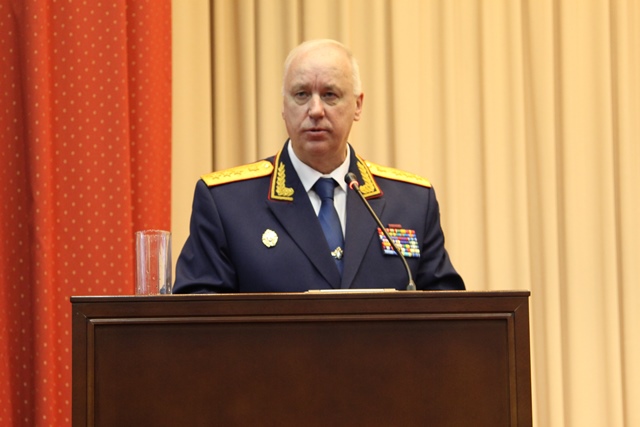
Address of the reception office of the Investigative Committee: Moscow, ul. Pervaya Frunzenskaya, d 3a
Address for writtent applications: 105005, Moscow, Tekhnichesky Pereulok, 2
Address of the reception office of the Investigative Committee: Moscow, ul. Pervaya Frunzenskaya, d 3a
Address for writtent applications: 105005, Moscow, Tekhnichesky Pereulok, 2

Today the Russia’s Investigative Committee held an enlarged meeting of the board discussing performance of investigating bodies in 2013 and setting tasks for 2014.
The meeting was attended by Chairperson of Security and Anticorruption Committee of the State Duma Irina Yarovaya, First Vice-Chairman of Nationalities Committee of the State Duma Mikhail Starshinov, Presidential Plenipotentiary in the Central Federal District Alexander Beglov, Children's Rights Commissioner for the President of the Russian Federation Pavel Astakhov, Minister of Interior Vladimir Kolokoltsev, Director of the Federal Security Service Alexander Bortnikov, head of the Federal Taxation Service Mikhail Mishustin, Chairman of the Chamber of Accounts Tatyana Golikova, Deputy Prosecutor General of the Russian Federation Viktor Grin, State Counselor of Justice Alexander Sukharev, representatives of legislative, executive and judicial authorities, heads and representatives of divisions of the Central Office of the Russia’s Investigative Committee, heads of investigating directorates in the subjects of the Russian Federation.
In his report the Chairman of the Investigative Committee assessed performance of the Committee in its main areas of activity. “The general mass of registered crimes has fell by 4% (it is 2 million 206 thousand crimes). The number of murders has dropped by 7%, the number of intentional infliction of grievous bodily harm – by 6%, rapes – by 5%”, - noted Alexander Bastrykin.
Talking about the number of investigated criminal cases the Chairman said that “Investigators had in their proceedings over 226 thousand criminal cases, which is 14 thousand more than in 2012. They finished proceedings over more than 115 thousand cases (9 thousand more than in 2012). Almost all of them were sent to court of justice and the guilty were punished. Our employees had to work in difficult conditions. A high work load (3 criminal cases per investigator a month) was added to a considerable number of calls on the crime scenes (189 thousand) and to review of a lot of reports on crimes (810 thousand)”.
Mr. Bastrykin also stressed the increase in percentage of solved criminal cases over serious and especially serious crimes: “Together with operational units of the Russian Interior Ministry and Federal Security Service we now solve 88% of murders and 93% of rapes. using this opportunity I would like to thank our colleagues from the Russian Interior Ministry and Federal Security Service for their amicable cooperation in solving crimes”.
For the reason that one of the prioritized areas of activity of the Russia’s Investigative Committee is solving crimes of past years, the Chairman noted successes made by criminalists: “I can say that this work is done successfully. In 2013 they solved nearly 8 thousand crimes of past years (7,983), including over 3,500 of serious and especially serious ones (3,738)”.
At the same time the Chairman talked about corruption crimes. It was noted that in 2013 the Investigative Committee received more than 45 thousand reports on acts of corruption, over which more than 28 thousand criminal proceedings were launched. Investigators finished over 12 thousand criminal cases (12,168), which is almost 5,500 thousand more of the previous number (6,682). Almost all of them were sent to court.
In conclusion of his speech the Chairman outlined the tasks the Committee is going to resolve this year:
1. During investigation of acts of corruption to pay special attention to reports of corruption in the area of privatization of state property and realization of secondary assets of stat-owned enterprises by the state.
2. To enhance effectiveness of battle against extremism and terrorism, especially in North-Caucasian Federal District.
3. To take additional measures to enhance effectiveness of preliminary investigation.
4. When organizing procedural control to pay special attention to criminal cases and investigating operations most open to risk of oversight.
5. To study carefully the reasons for extension of procedural terms over each criminal case.
6. To develop constructive cooperation with the Prosecutor-General’s Office, Chamber of Accounts and other surveillance and supervision bodies. To implement consistently policy of transparency of investigating bodies.
7. To take under special control the work concerning applications of citizens. To provide proper protection of rights of victims of crimes in the light of new amendments to legislation regarding consolidation of their status. To take exhaustive measures to reparation of damages.
In addition, during the meeting there were announced the results of the contest among journalists on the best coverage of activity of the Russia’s Investigative Committee. The results are posted on the website of the Committee.